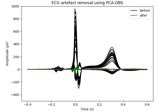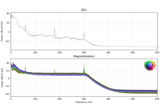mne.preprocessing.fix_stim_artifact#
- mne.preprocessing.fix_stim_artifact(inst, events=None, event_id=None, tmin=0.0, tmax=0.01, *, baseline=None, mode='linear', stim_channel=None, picks=None)[source]#
Eliminate stimulation’s artifacts from instance.
Note
This function operates in-place, consider passing
inst.copy()if this is not desired.- Parameters:
- instinstance of
RaworEpochsorEvoked The data.
- events
array, shape (n_events, 3) The list of events. Required only when inst is Raw.
- event_id
int The id of the events generating the stimulation artifacts. If None, read all events. Required only when inst is Raw.
- tmin
float Start time of the interpolation window in seconds.
- tmax
float End time of the interpolation window in seconds.
- baseline
None|tuple, shape (2,) The baseline to use when
mode='constant', in which case it must be non-None.New in v1.8.
- mode‘linear’ | ‘window’ | ‘constant’
Way to fill the artifacted time interval.
"linear"Does linear interpolation.
"window"Applies a
(1 - hanning)window."constant"Uses baseline average. baseline parameter must be provided.
Changed in version 1.8: Added the
"constant"mode.- stim_channel
str|None Stim channel to use.
- picks
str| array_like |slice|None Channels to include. Slices and lists of integers will be interpreted as channel indices. In lists, channel type strings (e.g.,
['meg', 'eeg']) will pick channels of those types, channel name strings (e.g.,['MEG0111', 'MEG2623']will pick the given channels. Can also be the string values'all'to pick all channels, or'data'to pick data channels. None (default) will pick all data channels. Note that channels ininfo['bads']will be included if their names or indices are explicitly provided.
- instinstance of
- Returns:
Examples using mne.preprocessing.fix_stim_artifact#

Principal Component Analysis - Optimal Basis Sets (PCA-OBS) removing cardiac artefact
